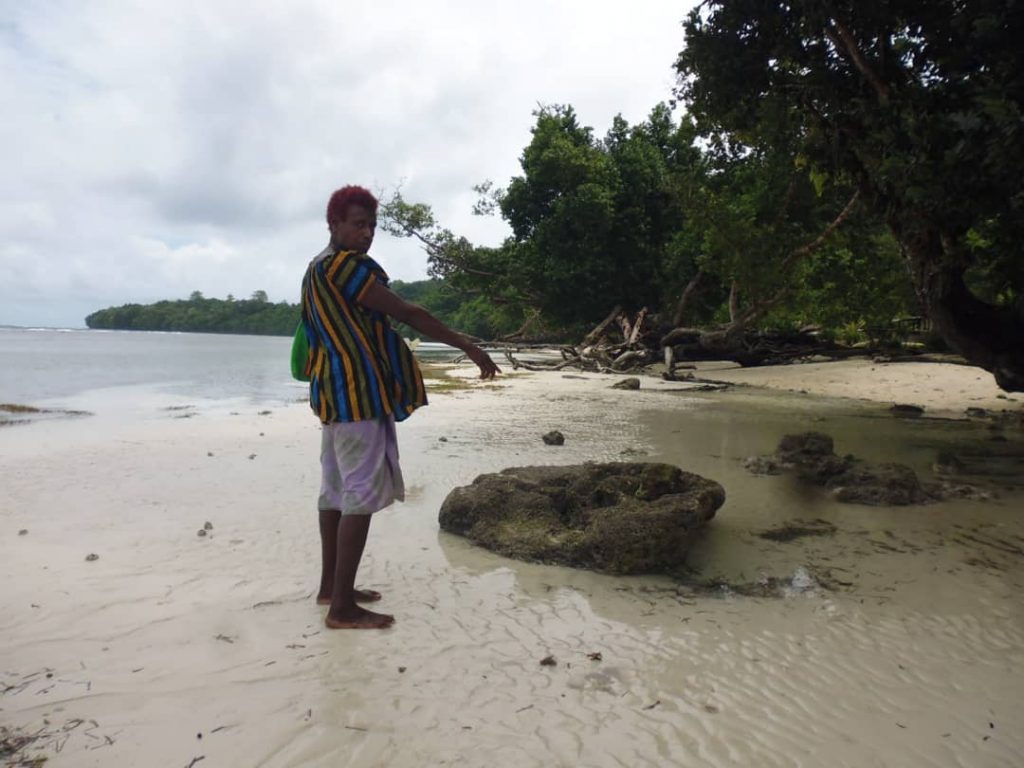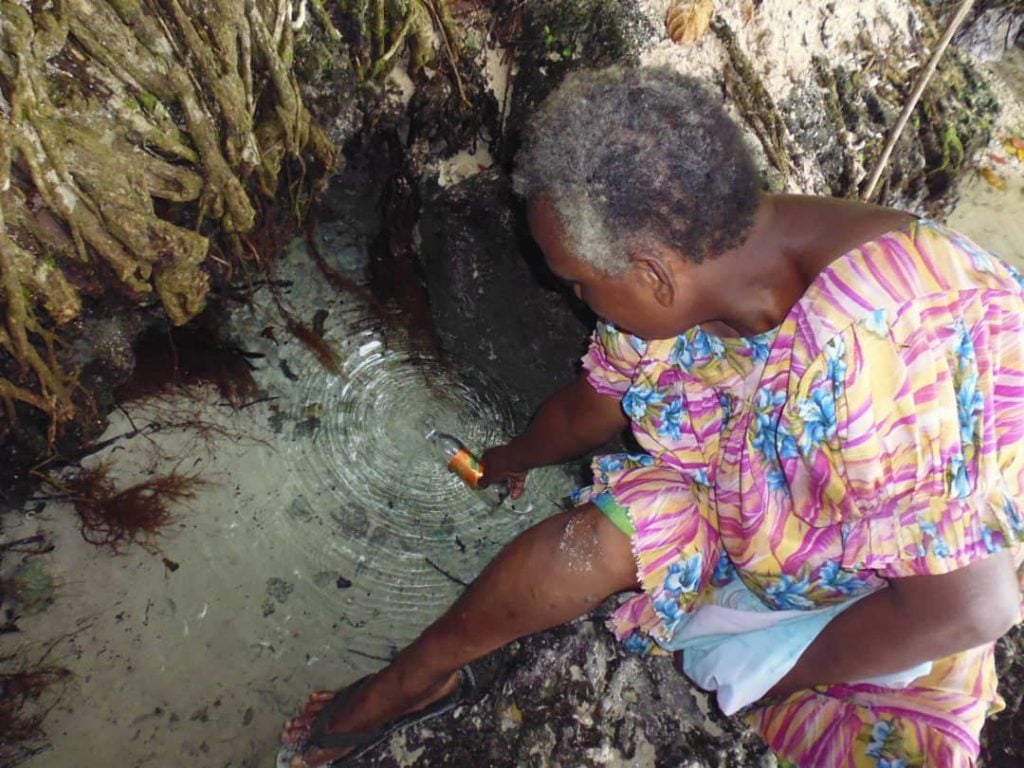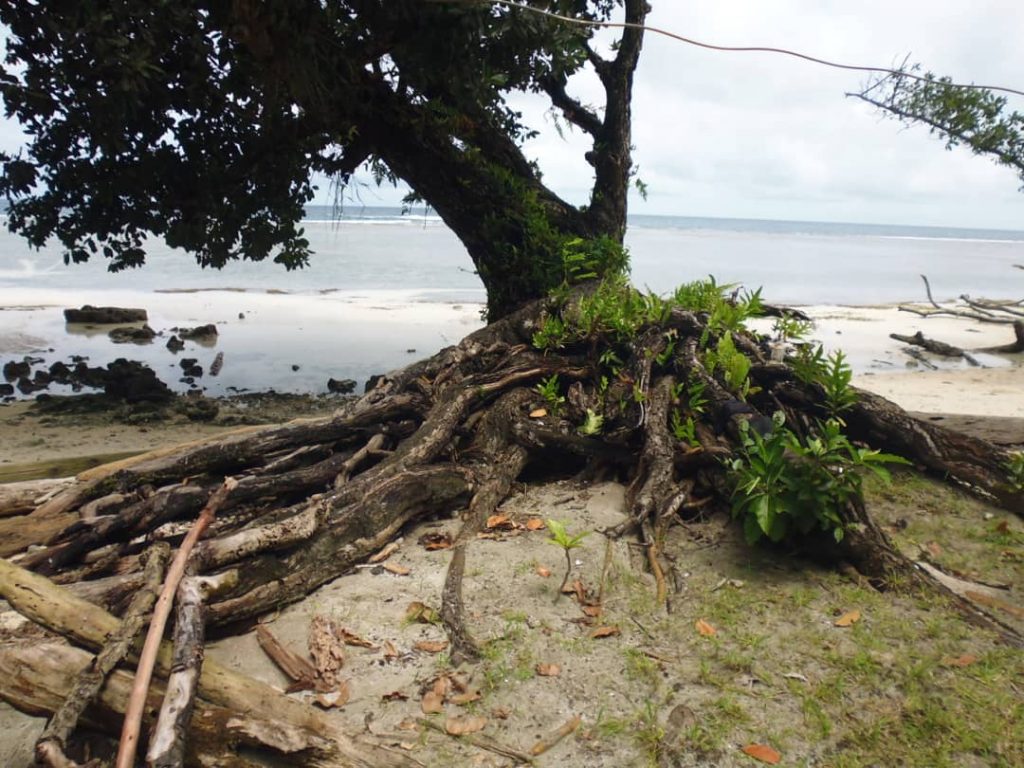Over 200,000 people live in the New Ireland Province north of mainland Papua New Guinea which is surrounded by the Bismarck Sea. Climate change poses a challenge to the lives and livelihoods of the people in the communities, particularly in Panachais Village, which is vulnerable to sea level rise and high tides.
For most of the people in the province, climate change is already a major issue, particularly for the poor and vulnerable.
“When I came here in 1980, my first house was right next to the sea but the spot is now underwater. Where my current house now stand use to be a swampy piece of land that I packed with rubbish over the years, making it solid enough to build my house,” said Stella Boski, a women leader who lives in Panachais for over 30 years now. She said she witnessed the damage on their beaches, caused by the rising sea level over the years.
Boski said the villagers source their drinking water from the nearby spring. But when its high tide, the spring is contaminated and they try their best to catch rain water using empty drums for drinking and cooking, she lamented.
With less than a thousand people, Boski’s community is severely affected by the rising seas. The people have been living by the sea for hundreds of years, and depend on it to sustain their livelihood. Their main source of drinking water comes from the nearby springs along the beach, where the water is used for cooking and drinking.

If one visits the village, what used to be beautiful white sandy beaches with houses lined along the beachfront, is now replaced with uprooted trees lying along the beach. The people are now moving further away from the beach as the sea rises rising sea level mercilessly eats away their coastline.
Recently, three water tanks were installed by the United States Agency for International Development (USAID). The people use these tanks to harvest rainwater.
“The tank has really helped us. But we would like the see the government or donor agencies assist us by building sea walls along our coast line or build an access road to our blocks of land that is situated up the mountains. At the moment, we can move as we have mountains right in front of us with no access roads,” Boski lamented.
Like Boski, Damien Bolaf, 55, spent all his life in the village. He lives along the coastal area with his six children. He said, the sea has always been a part of their livelihood but their physical environment is not like what is used to be before.
“Over the years, the sea has been eating away our coastline and we cannot move further inland because we are surrounded with mountains. There is no access road leading up to the mountains where we can use to transport our building materials up to settle on the mountain tops,” he said. “When I was a child, the sandy beaches stretched to where it is now covered by sea and we cannot really challenge nature. We tried to erect gabion baskets along our coastline but all these baskets have been washed away.”

Bolaf said he and his family depend on the spring water along the beach to drink and cook. “ But when it’s the high tide season, the water is contaminated with debris and it takes us weeks to clean out the water source before we can start drinking again. The trees that are now lying on the beach were once standing tall and our coastline was so beautiful. I am worried the future generation of this village won’t be able to see and experience the beautiful beaches we enjoyed in our childhood day back in the 1960s leading up to the early 90s,” he said.
Traditional Chief Francis Bolaf said his people are living in a “disaster zone” because they are continuously hard hit by strong winds and rising sea level.
“We are among the five communities in New Ireland Province that are affected by the rising sea level and eroding coastlines and it’s a very big problem for those of us that live along the coast,” Bolaf explained. “ The Tigak Islands are also affected and we hope the government and our political leaders address this problem.”

Bolaf hoped that the government builds an access road inland so that the people in the village can move to other places. He also hoped that the New Ireland Provincial Government works with the PNG Office of Climate Change and Development Authority to find some solutions in the problems they are facing nowadays.
“ Right now, we need proper tap water and a good seawall to be erected on the beachfront to protect our shorelines from the rising sea. The long-term plan is to relocate inland,” Bolaf said.
This story was commissioned and produced under the EJN Asia-Pacific Programme 2018 with the support of Sweden/SIDA.




